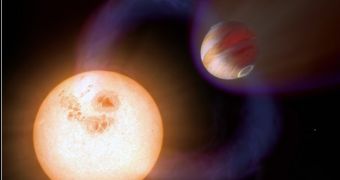Scripps Research Institute (SRI) scientist Gerald Joyce, a prominent molecular biologist, says that scientists needs to slow down in making unfounded claims about alien life. He says that both experts and laypeople will eventually lose interest in conducting the type of science that is actually needed for identifying potential extraterrestrial lifeforms.
In 2010, for example, the discovery of a bacteria that featured arsenic as a main component of its diet made many experts posit that similar organisms could appear on extrasolar planets. There is no way of confirming that, Joyce says, short of going there and actually looking.
The scientist expressed his beliefs in a paper published in the latest issue of the peer-reviewed, open-access journal PLoS ONE, which is edited by the Public Library of Science. He argues that scientists and the media currently tend to over-sensationalize all progress in this area of study.
When famed molecular biologist J. Craig Venter announced the successful implantation of a synthetic genome into a living cell – and the creation of a new lifeform – news outlets were also filled with a lot of speculation about the potential nature of extraterrestrial lifeforms on other worlds, Space reports.
“I just worry that we cry wolf too many times, and people are going to start tuning it out. Let's just cool it on these false alarms,” he said in a recent interview. Joyce explained that he did not mean his statements to be demeaning to the important work conducted for the aforementioned studies.
The problem stems from the recent discovery of several exoplanets that orbit inside the habitable zone of their parent stars. These are areas where temperature ranges are just right to support the presence of liquid water on the planets' surfaces, just like on Earth.
When it comes down to it, the expert writes, there is no type of concrete evidence to suggest that there actually is life on other worlds except our own. There have been no studies to demonstrate this, just that some places may exhibit some of the conditions that favored the development of life here.
“We can take pure chemicals in a test tube and stack the deck like crazy to try to get something replicating and evolving, and that hasn't happened yet. Right now the jury's out on whether it's hard or easy,” Joyce adds.
Statistically speaking, we only have one world among many trillions in the Universe to consider. Earth is the only place known to display lifeforms, and it could very well represent an anomaly, not an indicator of a general trend.
“To me, it's something kind of fundamental about human loneliness. We just wish it to be, so that we're not alone,” the SRI expert concluded.

 14 DAY TRIAL //
14 DAY TRIAL //